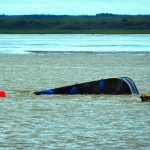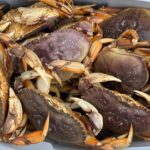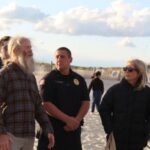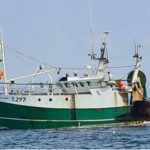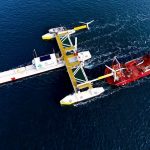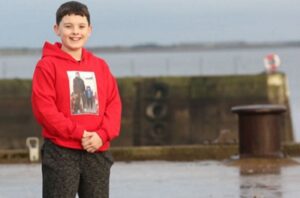Monthly Archives: August 2016
‘Deadliest Catch’ Contract Renewals For Captains Sig Hansen, Bill Wichrowski, Others Due This Year
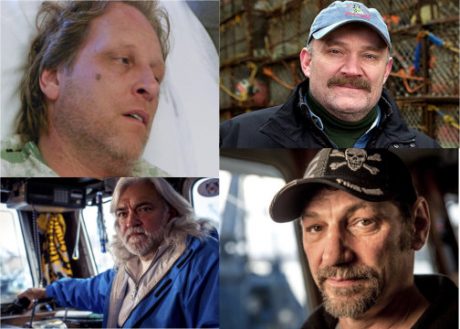 Contract renewals are coming up for Deadliest Catch Season 13. Several of the veteran captains who fans have come to know and adore are due to sign on for another season, but will any of them back out? On the Season 12 finale, Sig was told by the doctor in Anchorage that if he wants to prolong his life, he needs to make serious lifestyle changes. Work-related stress and smoking cigarettes were the reasons of his heart attack. As a commercial fisherman, stress is unavoidable. Will this culminate in Sig not renewing his contract for another season of Deadliest Catch. Capt. Bill Wichrowski was asked about his thoughts regarding the contract renewals in an interview this week. He says that not just anyone on the cast can keep the Discovery series afloat with the kind of ratings it’s seen. “Well, I don’t think just any group of guys can make this happen. Phil [Harris] was one of the original guys and we lost Phil and Phil’s still as much a part of the show as some of the guys on the show,” Read the rest here 18:48
Contract renewals are coming up for Deadliest Catch Season 13. Several of the veteran captains who fans have come to know and adore are due to sign on for another season, but will any of them back out? On the Season 12 finale, Sig was told by the doctor in Anchorage that if he wants to prolong his life, he needs to make serious lifestyle changes. Work-related stress and smoking cigarettes were the reasons of his heart attack. As a commercial fisherman, stress is unavoidable. Will this culminate in Sig not renewing his contract for another season of Deadliest Catch. Capt. Bill Wichrowski was asked about his thoughts regarding the contract renewals in an interview this week. He says that not just anyone on the cast can keep the Discovery series afloat with the kind of ratings it’s seen. “Well, I don’t think just any group of guys can make this happen. Phil [Harris] was one of the original guys and we lost Phil and Phil’s still as much a part of the show as some of the guys on the show,” Read the rest here 18:48
Fish and Game cuts gold king crab quota despite lack of data
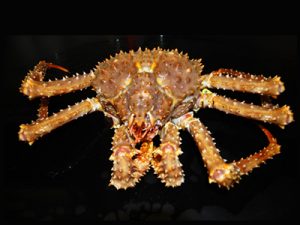 Despite industry claims of a fishery in “robust condition,” golden king crab, long the most stable of all the commercial shellfish species in the Bering Sea, has taken a steep cut in the quota in the western district, to 2.235 million pounds, down from 2.98 million, a 25 percent drop because of declines in all indicators, including size, weight, and catch, according to the Alaska Department of Fish and Game. The season opened Aug. 1 in both districts, separated near Atka Island. The eastern quota is unchanged at 3.310 million pounds. The decline has been gradually occurring for at least the past four years, according to shellfish biologist Miranda Westphal, of Fish and Game in Unalaska. But you wouldn’t have thought the fishery’s future was anything but bright, if you only listened to the gold crabbers’ efforts to boost the quotas a couple of years ago, with claims of a “surplus” by their lobbyist who criticized the regulators who failed to vote his way. Read the story here 16:26
Despite industry claims of a fishery in “robust condition,” golden king crab, long the most stable of all the commercial shellfish species in the Bering Sea, has taken a steep cut in the quota in the western district, to 2.235 million pounds, down from 2.98 million, a 25 percent drop because of declines in all indicators, including size, weight, and catch, according to the Alaska Department of Fish and Game. The season opened Aug. 1 in both districts, separated near Atka Island. The eastern quota is unchanged at 3.310 million pounds. The decline has been gradually occurring for at least the past four years, according to shellfish biologist Miranda Westphal, of Fish and Game in Unalaska. But you wouldn’t have thought the fishery’s future was anything but bright, if you only listened to the gold crabbers’ efforts to boost the quotas a couple of years ago, with claims of a “surplus” by their lobbyist who criticized the regulators who failed to vote his way. Read the story here 16:26
This blueberry-cured red salmon captures the best of Alaska’s wild bounty
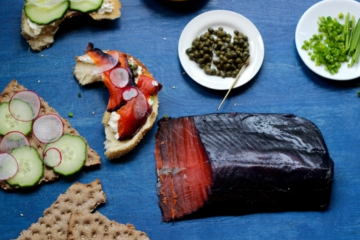 When I first mentioned to some Alaska friends that I was heading to Cordova for the first time, the oohs and ahhs were unanimous. “It’s a very special place,” one lifelong Alaskan assured me. “Magical,” another sighed. Coming from Alaskans who already live in a stunningly beautiful part of the world, I was definitely intrigued. Tasting wild salmon fresh from the water, we didn’t think it could get any better. But then we met the gillnetters, a diverse community of fishermen, many whose families have been in the area for decades, including Tony Hoover, an artist-fisherman and the son of one of Alaska’s most revered artists, John Hoover. Aside from the wild salmon, what do these families eat? I wanted to know. Author: , Read the story here, and check out the recipe! 14:46
When I first mentioned to some Alaska friends that I was heading to Cordova for the first time, the oohs and ahhs were unanimous. “It’s a very special place,” one lifelong Alaskan assured me. “Magical,” another sighed. Coming from Alaskans who already live in a stunningly beautiful part of the world, I was definitely intrigued. Tasting wild salmon fresh from the water, we didn’t think it could get any better. But then we met the gillnetters, a diverse community of fishermen, many whose families have been in the area for decades, including Tony Hoover, an artist-fisherman and the son of one of Alaska’s most revered artists, John Hoover. Aside from the wild salmon, what do these families eat? I wanted to know. Author: , Read the story here, and check out the recipe! 14:46
Longstanding fisheries act doesn’t need changing says Hogarth and Murawski, Sam Parisi disagrees
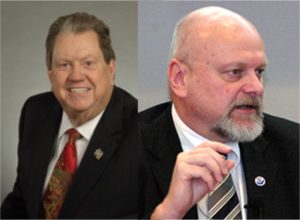 Those who catch ocean fish, dine on the country’s marine bounty or simply appreciate the remarkable improvement in the state of America’s fisheries can thank the Magnuson-Stevens Fishery Conservation and Management Act. From its passage in 1976, the nation’s premier fisheries law has been remarkably free of the party politics so often exhibited these days. And that’s exactly why we need to be careful about some current initiatives to change it. As we approach the transition to a new administration, however, a number of proposals have emerged to revise the law or change its administrative guidelines. Unfortunately, these would loosen effective protections that have been so successful in eliminating overfishing and rebuilding stocks. Read the rest here Fishermen take another hit. NOAA wins again. How can you beat them? It seems like the deck is stacked against fishermen. Take the case in New Hampshire (”Judge rules for government in monitoring suit,” July 29). The judge ruled under the law he does not have to take into account any other scientific data. In other words, what NOAA research vessels say is the bottom line. First of all, ask a real fishermen with 20 or more years experience if those on the NOAA research vessel know what they are doing. They will tell you perhaps not. If the judge was ruling because of the way the law is written, then we need to change the law .It has been more than 50 years since the Magnuson-Stevens Act was passed. A lot has changed. We need to review the act and if necessary modify it, or our fishermen will never be able to beat NOAA in a court of law. Sam Parisi Gloucester 14:20
Those who catch ocean fish, dine on the country’s marine bounty or simply appreciate the remarkable improvement in the state of America’s fisheries can thank the Magnuson-Stevens Fishery Conservation and Management Act. From its passage in 1976, the nation’s premier fisheries law has been remarkably free of the party politics so often exhibited these days. And that’s exactly why we need to be careful about some current initiatives to change it. As we approach the transition to a new administration, however, a number of proposals have emerged to revise the law or change its administrative guidelines. Unfortunately, these would loosen effective protections that have been so successful in eliminating overfishing and rebuilding stocks. Read the rest here Fishermen take another hit. NOAA wins again. How can you beat them? It seems like the deck is stacked against fishermen. Take the case in New Hampshire (”Judge rules for government in monitoring suit,” July 29). The judge ruled under the law he does not have to take into account any other scientific data. In other words, what NOAA research vessels say is the bottom line. First of all, ask a real fishermen with 20 or more years experience if those on the NOAA research vessel know what they are doing. They will tell you perhaps not. If the judge was ruling because of the way the law is written, then we need to change the law .It has been more than 50 years since the Magnuson-Stevens Act was passed. A lot has changed. We need to review the act and if necessary modify it, or our fishermen will never be able to beat NOAA in a court of law. Sam Parisi Gloucester 14:20
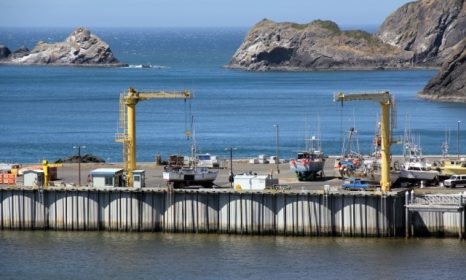
Northwest Fishing Communities Find Economic Power Doing Business Together
Six port communities on Oregon’s rocky southwestern coast are taking their seafood-rich economy into their own hands. More than 80 percent of the state’s catch travels frozen to places like China for processing before working its way back to Oregon and other dinner plates. The lack of local and regional links in global seafood supply chains is the problem that the Southwestern Oregon Food Systems Collaborative is working to change. Its strategy is to build new locally-owned, mutual-aid supply chains — or value chains — across great market gaps that have grown in the wake of the region’s near-total focus on global commodity exports. The approach is showing signs of success in southwestern Oregon. It also shows real potential for transitioning so many other, mostly rural places now caught between past economies of resource extraction and future economies of resource conservation. Read the rest here 12:36
N.C. Division of Marine Fisheries: Dealers will no longer need permit for pound-netted flounder
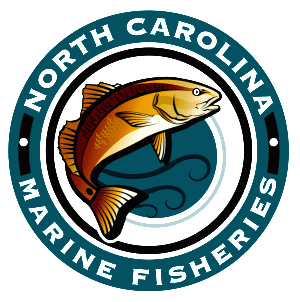 The state’s marine fisheries division has rescinded a regulation requiring seafood dealers to hold a special permit to buy flounder from pound net fishermen and to report those landings daily. Instead, the N.C. Division of Marine Fisheries will require fishermen who hold pound net permits and are participating in the flounder pound net fishery to report their daily landings of flounder to the division. The daily reporting requirement will begin Sept. 1. The division will mail information about this new permit condition to pound net permit holders who have reported flounder landings in the past five years. The information will be sent by Aug. 5. Additionally, the division will schedule meetings to explain the new permit and reporting requirements to pound net fishermen. Dates, times and locations of these meetings will be announced once they are set. Read the rest here 12:20
The state’s marine fisheries division has rescinded a regulation requiring seafood dealers to hold a special permit to buy flounder from pound net fishermen and to report those landings daily. Instead, the N.C. Division of Marine Fisheries will require fishermen who hold pound net permits and are participating in the flounder pound net fishery to report their daily landings of flounder to the division. The daily reporting requirement will begin Sept. 1. The division will mail information about this new permit condition to pound net permit holders who have reported flounder landings in the past five years. The information will be sent by Aug. 5. Additionally, the division will schedule meetings to explain the new permit and reporting requirements to pound net fishermen. Dates, times and locations of these meetings will be announced once they are set. Read the rest here 12:20
Ex-Parties to the Nauru agreement CEO says fish money wont last
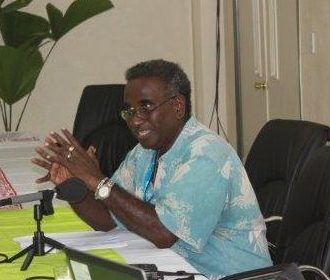 Members of the Parties to the Nauru agreement are reaping large returns off fishing vessel licenses but the PNA says the windfall won’t last forever. The eight member countries of the PNA and Tokelau employ a vessel day scheme which charges foreign ships at least US$8,000 a day to fish in their waters. High demand for the limited number of fishing days has sparked a bidding war between companies with some paying as much as US$16,000 per day. The outgoing CEO of the PNA, Transform Aqorau, said the demand reveals the value that could be obtained from fisheries but it would not last forever. Dr Aqorau also adds those who want to change the vessel day scheme should think carefully. Read the rest here 11:58
Members of the Parties to the Nauru agreement are reaping large returns off fishing vessel licenses but the PNA says the windfall won’t last forever. The eight member countries of the PNA and Tokelau employ a vessel day scheme which charges foreign ships at least US$8,000 a day to fish in their waters. High demand for the limited number of fishing days has sparked a bidding war between companies with some paying as much as US$16,000 per day. The outgoing CEO of the PNA, Transform Aqorau, said the demand reveals the value that could be obtained from fisheries but it would not last forever. Dr Aqorau also adds those who want to change the vessel day scheme should think carefully. Read the rest here 11:58
Mississippi fishermen busted with more than three tons of illegally caught shrimp in Louisiana waters
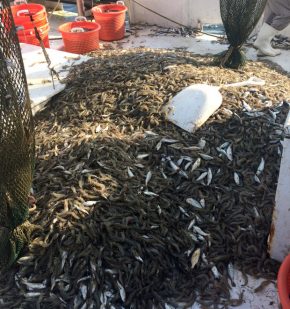 A Louisiana Department of Wildlife and Fisheries agent Tuesday busted four Mississippi men with more than three tons of shrimp caught illegally in Louisiana waters, the agency reported. According to the department, Senior Agent Brett Nabors received a complaint about a boat actively shrimping in Lake Borgne near the Rigolets. After arriving in the area at 8:10 a.m., Nabors says he saw a boat with its nets in the water. He ordered the captain to retrieve his nets, and saw shrimp and bycatch in the closed tails of the trawls, the department reported. Nabors then cited Joe Tran, 48, Duc Le, 48, Tri Le, 55, and Phung Hoang, 59, for trawling in a closed season. He seized 6,100 pounds of shrimp, and sold them to the highest bidder. Using skimmers in a closed season brings a $400 to $950 fine and up to 120 days in jail and forfeiture of anything seized. Read the rest here 11:30
A Louisiana Department of Wildlife and Fisheries agent Tuesday busted four Mississippi men with more than three tons of shrimp caught illegally in Louisiana waters, the agency reported. According to the department, Senior Agent Brett Nabors received a complaint about a boat actively shrimping in Lake Borgne near the Rigolets. After arriving in the area at 8:10 a.m., Nabors says he saw a boat with its nets in the water. He ordered the captain to retrieve his nets, and saw shrimp and bycatch in the closed tails of the trawls, the department reported. Nabors then cited Joe Tran, 48, Duc Le, 48, Tri Le, 55, and Phung Hoang, 59, for trawling in a closed season. He seized 6,100 pounds of shrimp, and sold them to the highest bidder. Using skimmers in a closed season brings a $400 to $950 fine and up to 120 days in jail and forfeiture of anything seized. Read the rest here 11:30
Fishermen Oppose National Marine Monument Off New England
 A plan announced Thursday that would designate a unique undersea area 150 miles off the New England coast as the nation’s first Atlantic marine national monument was met with immediate opposition from commercial fishermen. The proposal would dramatically restrict commercial fishing in that area and is drawing fierce opposition from commercial fisherman like Stonington’s Bobby Guzzo, who owns and operates two boats “That’s just the government trying to take all our water,” Guzzo said Thursday from aboard his fishing vessel. “I’m dead set against it.” Joseph Gilbert’s Empire Fisheries operates four fishing boats out of Stonington, and he also has problems with the proposed undersea sanctuary. “Fishermen are conservationists, too,” Gilbert said, explaining that he believes the proposal “is well intentioned” but simply “goes too far” without considering the impact on commercial fishing operations and supplies of fish for consumers. “A lot of these areas are protected already,” Gilbert said. Read the rest here 08:45
A plan announced Thursday that would designate a unique undersea area 150 miles off the New England coast as the nation’s first Atlantic marine national monument was met with immediate opposition from commercial fishermen. The proposal would dramatically restrict commercial fishing in that area and is drawing fierce opposition from commercial fisherman like Stonington’s Bobby Guzzo, who owns and operates two boats “That’s just the government trying to take all our water,” Guzzo said Thursday from aboard his fishing vessel. “I’m dead set against it.” Joseph Gilbert’s Empire Fisheries operates four fishing boats out of Stonington, and he also has problems with the proposed undersea sanctuary. “Fishermen are conservationists, too,” Gilbert said, explaining that he believes the proposal “is well intentioned” but simply “goes too far” without considering the impact on commercial fishing operations and supplies of fish for consumers. “A lot of these areas are protected already,” Gilbert said. Read the rest here 08:45
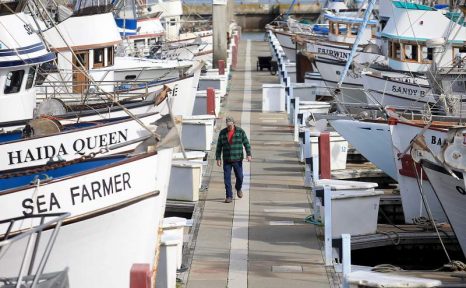
Delayed Dungeness crab season sinks catch, sales for California fishermen
A historic delay in the 2015-16 Dungeness crab season reduced statewide commercial landings by more than a third this year and cut into gross sales off the boat by about 44 percent, according to preliminary figures from the state. Bodega Bay, one of nine key commercial ports between Morro Bay and Crescent City, mirrored the sharp statewide downturn, with Dungeness landings down 37 percent from the previous season, to 1.8 million pounds, according to early calculations. The figures, from the state Department of Fish and Wildlife, offer the first postseason look at a grim year for the normally lucrative commercial Dungeness fishery — the state’s second-most valuable, worth about $60 million in most years. Gross sales last season for the crab fleet topped $33 million, about 45 percent of the 5-year average, according to state Sen. Mike McGuire, D-Healdsburg, chairman of the Legislature’s Joint Committee on Fisheries and Aquaculture. Read the story here 19:56
Louisiana Department of Wildlife and Fisheries sets fall inshore shrimp season opening dates
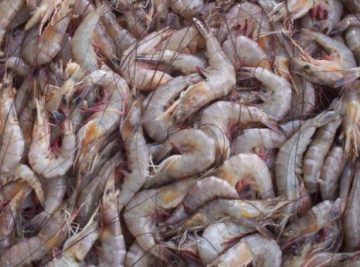 The fall inshore shrimp season will have a split opening with the eastern part of the state opening at 6 p.m. on August 15 and the west side opening at 6 a.m. on August 22. The Atchafalaya River is the boundary line between the regions. The Louisiana Department of Wildlife and Fisheries unanimously approved the dates at its meeting Thursday morning. LDWF biologists set the dates based on research and samples. All locals who spoke at the meeting supported the dates. When samples were taken last week, the shrimp in the western part of the state in Vermilion, Cote Blanc and Calcasieu basins were still very small. The shrimp in the eastern part in Barataria and Terrebonne basins were significantly larger. The extra week for the west will allow the shrimp time to grow to the proper size for catching. Read the rest here 17:47
The fall inshore shrimp season will have a split opening with the eastern part of the state opening at 6 p.m. on August 15 and the west side opening at 6 a.m. on August 22. The Atchafalaya River is the boundary line between the regions. The Louisiana Department of Wildlife and Fisheries unanimously approved the dates at its meeting Thursday morning. LDWF biologists set the dates based on research and samples. All locals who spoke at the meeting supported the dates. When samples were taken last week, the shrimp in the western part of the state in Vermilion, Cote Blanc and Calcasieu basins were still very small. The shrimp in the eastern part in Barataria and Terrebonne basins were significantly larger. The extra week for the west will allow the shrimp time to grow to the proper size for catching. Read the rest here 17:47
Connecticut Delegation Urges Obama to Designate First Ever Atlantic Marine National Monument
 U.S. Senator Richard Blumenthal (D-Conn.) led the Connecticut Congressional Delegation today in urging President Barack Obama to designate the New England Coral Canyons and Seamounts as the nation’s first ever Atlantic marine national monument. The letter, signed by Blumenthal, U.S. Senator Chris Murphy (D-Conn.), Congressman John Larson (CT-1), Congressman Joe Courtney (CT-2), Congresswoman Rosa DeLauro (CT-3), Congressman Jim Himes (CT-4) and Congresswoman Elizabeth Esty (CT-5), urges the President to use his authority under the Antiquities Act of 1906 to preserve and protect the unique environmental treasure. Designation as a national monument would protect the area from damaging commercial activity and ensure proper care and management. The measure would protect countless species from irreversible damage, help make the ocean more resilient to climate change, support economic activity reliant on the health of the ocean, advance research, and preserve natural history. Read the rest here 15:11
U.S. Senator Richard Blumenthal (D-Conn.) led the Connecticut Congressional Delegation today in urging President Barack Obama to designate the New England Coral Canyons and Seamounts as the nation’s first ever Atlantic marine national monument. The letter, signed by Blumenthal, U.S. Senator Chris Murphy (D-Conn.), Congressman John Larson (CT-1), Congressman Joe Courtney (CT-2), Congresswoman Rosa DeLauro (CT-3), Congressman Jim Himes (CT-4) and Congresswoman Elizabeth Esty (CT-5), urges the President to use his authority under the Antiquities Act of 1906 to preserve and protect the unique environmental treasure. Designation as a national monument would protect the area from damaging commercial activity and ensure proper care and management. The measure would protect countless species from irreversible damage, help make the ocean more resilient to climate change, support economic activity reliant on the health of the ocean, advance research, and preserve natural history. Read the rest here 15:11
Threatened restrictions on the commercial harvest of bluefish in New York State have been abandoned
 Threatened restrictions on the commercial harvest of bluefish in New York State have been abandoned after lawmakers urged federal regulators to take action to salvage the 2016 season. In an order this week, the National Oceanic and Atmospheric Administration determined bluefish are “not overfished or experiencing overfishing.” The order allows for more than 1.5 million pounds of quota to be shifted among states and the commercial sector, allowing New York’s harvest to reach the previous year’s levels of some 500,000 pounds. The move salvages a commercial fishing season that state officials said would have been “devastated” by a closure. Last month, NOAA had threatened to close New York’s commercial fishery for bluefish after the annual harvest of 360,000 pounds was reached. “It looks like our advocacy paid off and they took a second look at the data which we called out for being outdated and wrong,” U.S. Rep. Lee Zeldin’s office said in a email. Read the rest here 12:44
Threatened restrictions on the commercial harvest of bluefish in New York State have been abandoned after lawmakers urged federal regulators to take action to salvage the 2016 season. In an order this week, the National Oceanic and Atmospheric Administration determined bluefish are “not overfished or experiencing overfishing.” The order allows for more than 1.5 million pounds of quota to be shifted among states and the commercial sector, allowing New York’s harvest to reach the previous year’s levels of some 500,000 pounds. The move salvages a commercial fishing season that state officials said would have been “devastated” by a closure. Last month, NOAA had threatened to close New York’s commercial fishery for bluefish after the annual harvest of 360,000 pounds was reached. “It looks like our advocacy paid off and they took a second look at the data which we called out for being outdated and wrong,” U.S. Rep. Lee Zeldin’s office said in a email. Read the rest here 12:44
Enviro Defense Fund Applauds 9th Circuit’s Pacific whiting fishery ruling
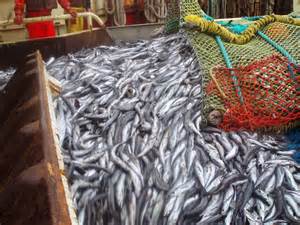 The Ninth Circuit on Wednesday upheld a federal program that limits the number of Pacific whiting, or hake, fishermen can catch off the Northwest Coast. Two fishing companies, Pacific Dawn and Jessie’s Ilwaco Fish Co., sued the Secretary of Commerce and the National Marine Fisheries Service in 2013, claiming the Fisheries Service unreasonably refused to consider fishing activity after 2003 and 2004 when it set new quotas in 2011 and 2013. The three-judge panel Wednesday refused to overturn U.S. District Judge Thelton Henderson’s 2013 grant of summary judgment. Writing for the panel, Judge Sandra Ikuta agreed that the Fisheries Service considered more recent fishing activity when it set quotas but that it “gave greater weight to historic participation” in setting the new limits. Pacific Dawn said it was “disappointed’ with the ruling. “The decision upholds an individual fishing quota program that resulted from no meaningful consideration of current harvests or present participation in the fishery, as Congress requires,” Pacific Dawn said in a statement. Read the rest here 11:59
The Ninth Circuit on Wednesday upheld a federal program that limits the number of Pacific whiting, or hake, fishermen can catch off the Northwest Coast. Two fishing companies, Pacific Dawn and Jessie’s Ilwaco Fish Co., sued the Secretary of Commerce and the National Marine Fisheries Service in 2013, claiming the Fisheries Service unreasonably refused to consider fishing activity after 2003 and 2004 when it set new quotas in 2011 and 2013. The three-judge panel Wednesday refused to overturn U.S. District Judge Thelton Henderson’s 2013 grant of summary judgment. Writing for the panel, Judge Sandra Ikuta agreed that the Fisheries Service considered more recent fishing activity when it set quotas but that it “gave greater weight to historic participation” in setting the new limits. Pacific Dawn said it was “disappointed’ with the ruling. “The decision upholds an individual fishing quota program that resulted from no meaningful consideration of current harvests or present participation in the fishery, as Congress requires,” Pacific Dawn said in a statement. Read the rest here 11:59
Summertime means whiting in Ipswich Bay
 In early July, (Heather Atwood) spoke to Gloucester fisherman Al Cottone, executive director of Gloucester Fisheries Commission, at the Gloucester Fishermen’s Wives offices after his fourth day of fishing for whiting. A strapping, dark-haired, 50-year-old, Cottone confessed he was beat. He’s not used to the unrelenting action that fishing for whiting demands anymore. Cottone has been fishing since he was 17, and has never had any other kind of work. But his ground fish quota this year, allocated by National Oceanic and Atmospheric Administration, was pared down to almost nothing: This means two things: Cottone cannot catch enough fish to make a living, unless he begins leasing quota from other fishermen, which has added costs. (Cottone says that many fishermen are so fed up, or they are just leasing their allocated quota to the few fishermen left, and finding other work.) It also means Cottone is out of shape; he just hasn’t had enough fishing practice recently. But Cottone loves fishing for whiting. Read the story here 10:58
In early July, (Heather Atwood) spoke to Gloucester fisherman Al Cottone, executive director of Gloucester Fisheries Commission, at the Gloucester Fishermen’s Wives offices after his fourth day of fishing for whiting. A strapping, dark-haired, 50-year-old, Cottone confessed he was beat. He’s not used to the unrelenting action that fishing for whiting demands anymore. Cottone has been fishing since he was 17, and has never had any other kind of work. But his ground fish quota this year, allocated by National Oceanic and Atmospheric Administration, was pared down to almost nothing: This means two things: Cottone cannot catch enough fish to make a living, unless he begins leasing quota from other fishermen, which has added costs. (Cottone says that many fishermen are so fed up, or they are just leasing their allocated quota to the few fishermen left, and finding other work.) It also means Cottone is out of shape; he just hasn’t had enough fishing practice recently. But Cottone loves fishing for whiting. Read the story here 10:58
Catch Shares: Commercial fishers on Far South Coast want action on restructure
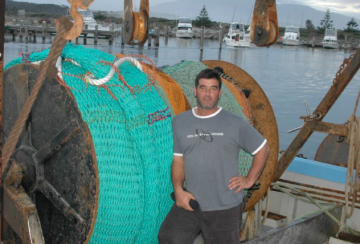 The restructure of the NSW commercial fishing industry is reaching an important milestone with companies and individuals having until tomorrow to decide on whether they take a $20,000 buy-out to exit the industry. NSW Labor called on the State Primary Industries Minister to suspend the restructure process until more information is on the table to assist fishers in making the right decision for themselves, their families, and for the sustainability of the industry in general. But Bermagui Fishermen’s Cooperative managing director Rocky Lagana was of the opposite view and said the three-year restructure process needed to reach a conclusion to afford those who wanted to remain some certainty. Shadow Minister for Primary Industries Mick Veitch however called it policy-on-the-run and said a hastily cobbled together Ministerial press release the day after Labor’s call for a suspension made a few concessions without addressing the real concerns – which are the need for more information, more time and the need to hit the pause button. Read the story here 10:26
The restructure of the NSW commercial fishing industry is reaching an important milestone with companies and individuals having until tomorrow to decide on whether they take a $20,000 buy-out to exit the industry. NSW Labor called on the State Primary Industries Minister to suspend the restructure process until more information is on the table to assist fishers in making the right decision for themselves, their families, and for the sustainability of the industry in general. But Bermagui Fishermen’s Cooperative managing director Rocky Lagana was of the opposite view and said the three-year restructure process needed to reach a conclusion to afford those who wanted to remain some certainty. Shadow Minister for Primary Industries Mick Veitch however called it policy-on-the-run and said a hastily cobbled together Ministerial press release the day after Labor’s call for a suspension made a few concessions without addressing the real concerns – which are the need for more information, more time and the need to hit the pause button. Read the story here 10:26
‘American Greed’ to Depict Fraud Victims, Local Retired Commercial Clammer
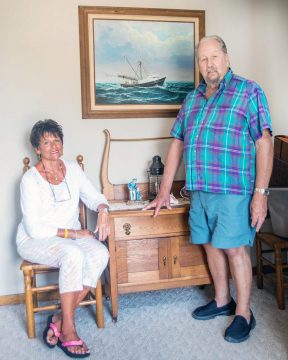 Jack and Dolly Patterson will be watching the Aug.11 episode of “American Greed” with particular disdain. The well-liked and respected residents of High Bar Harbor are featured on the MSNBC-TV show as victims of now-convicted broker Mark Hotton. The Pattersons say that in total they lost $3.2 million in retirement and life savings while investing with Hotton. Hotton, of West Islip, N.Y., is in federal prison on an 11¼-year sentence after pleading guilty to conspiracy to commit money laundering. The prison sentence handed down in U.S. District Court also covers complaints of other individuals and companies claiming losses that total more than $9 million. Jack Patterson, now 72, is a retired commercial clammer, a strenuous, often dangerous profession. As he says, “It wasn’t handed to us.” “Thirty-seven years on the water. And we had saved; we didn’t live beyond our means,” Dolly Patterson remarked. Speaking of hard-earned clamming proceeds from days that began at 1:30 in the morning, “I did good,” he said, “and he took it all.” Read the story here 08:38
Jack and Dolly Patterson will be watching the Aug.11 episode of “American Greed” with particular disdain. The well-liked and respected residents of High Bar Harbor are featured on the MSNBC-TV show as victims of now-convicted broker Mark Hotton. The Pattersons say that in total they lost $3.2 million in retirement and life savings while investing with Hotton. Hotton, of West Islip, N.Y., is in federal prison on an 11¼-year sentence after pleading guilty to conspiracy to commit money laundering. The prison sentence handed down in U.S. District Court also covers complaints of other individuals and companies claiming losses that total more than $9 million. Jack Patterson, now 72, is a retired commercial clammer, a strenuous, often dangerous profession. As he says, “It wasn’t handed to us.” “Thirty-seven years on the water. And we had saved; we didn’t live beyond our means,” Dolly Patterson remarked. Speaking of hard-earned clamming proceeds from days that began at 1:30 in the morning, “I did good,” he said, “and he took it all.” Read the story here 08:38
Florida Keys commercial lobster fleet prepares for Saturday’s opening
 Hopes are high for high prices and calm seas as the Florida Keys commercial lobster fleet prepares for Saturday’s opening of the regular crawfish season. “Based on the level of [juvenile lobster] recruitment we’ve seen, we expect another outstanding season,” Bill Kelly, executive director of the Florida Keys Commercial Fishermen’s Association, said Tuesday. Last year, Key commercial lobster trappers and divers collected about 5.2 million pounds of lobster, which accounts for 90 percent of Florida’s statewide lobster harvest. “Lobster is the largest [commercial fishing] cash crop in the Keys, and the largest in the state of Florida,” Kelly said. “Every season, our biggest issue facing lobster and stone-crab trap fishermen is tropical storms and hurricanes that displace and destroy gear and disrupt the normal migratory pattern of lobster,” Kelly said. “We’ve been pretty fortunate since Hurricane Wilma in 2005.” Read the story here 07:55
Hopes are high for high prices and calm seas as the Florida Keys commercial lobster fleet prepares for Saturday’s opening of the regular crawfish season. “Based on the level of [juvenile lobster] recruitment we’ve seen, we expect another outstanding season,” Bill Kelly, executive director of the Florida Keys Commercial Fishermen’s Association, said Tuesday. Last year, Key commercial lobster trappers and divers collected about 5.2 million pounds of lobster, which accounts for 90 percent of Florida’s statewide lobster harvest. “Lobster is the largest [commercial fishing] cash crop in the Keys, and the largest in the state of Florida,” Kelly said. “Every season, our biggest issue facing lobster and stone-crab trap fishermen is tropical storms and hurricanes that displace and destroy gear and disrupt the normal migratory pattern of lobster,” Kelly said. “We’ve been pretty fortunate since Hurricane Wilma in 2005.” Read the story here 07:55
Brownsville Tx. – Shrimpers struggling to compete with imported shrimp
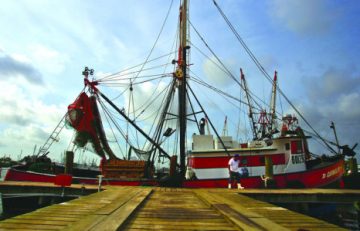 A slow start to the shrimping season has local shrimpers struggling to compete with imported farm-raised shrimp. Shrimpers are eager to return to local waters after being off for two months. “We have two boats and we’re probably one of the few people that actually jumped into this business without having a family history being in the business,” Texas Shrimp Association Executive Director Andrea Hance said. She’s been in the shrimping business since 2007. She said this season is slow, especially when it comes to their prized catch. “We have a niche market in terms of the large jumbo shrimp. We’re just not catching enough of them right now,” Hance said. She said they’re seeing a lot more small shrimp out in the Gulf which is unusual. A five-pound bag of locally-caught shrimp will cost someone about $30. Imported farm-raised shrimp will sell a similar bag for around $24. Video, Read the rest here 07:23
A slow start to the shrimping season has local shrimpers struggling to compete with imported farm-raised shrimp. Shrimpers are eager to return to local waters after being off for two months. “We have two boats and we’re probably one of the few people that actually jumped into this business without having a family history being in the business,” Texas Shrimp Association Executive Director Andrea Hance said. She’s been in the shrimping business since 2007. She said this season is slow, especially when it comes to their prized catch. “We have a niche market in terms of the large jumbo shrimp. We’re just not catching enough of them right now,” Hance said. She said they’re seeing a lot more small shrimp out in the Gulf which is unusual. A five-pound bag of locally-caught shrimp will cost someone about $30. Imported farm-raised shrimp will sell a similar bag for around $24. Video, Read the rest here 07:23
Gloucester’s Angela Sanfilippo, A Fisherman’s Wife, named to Seafood Hall of Fame
 Angela Sanfilippo has spent this week, just as she did last year, helping plan the annual foray by the city and its fishing community into Sunday’s fifth Boston Seafood Festival. This year, however, will be different. While the Gloucester contingent will be dishing out its wildly popular redfish soup, Sanfilippo will also be on the receiving end of a distinctive honor when she is ushered into the Boston Seafood Hall of Fame at the festival’s opening ceremony on the Boston Fish Pier. “I was surprised and pleased at the same time,” Sanfilippo said Wednesday. “I had no idea.”Citing her life’s work as an unwavering voice of the Gloucester and Massachusetts fishing communities, the Boston Fisheries Foundation said her induction is due to her role with the Gloucester Fishermen’s Wives Association (GFWA) and the Fishing Partnership Support Services as a “tireless protector” of the oceans those communities rely upon. Read the story here 21:35
Angela Sanfilippo has spent this week, just as she did last year, helping plan the annual foray by the city and its fishing community into Sunday’s fifth Boston Seafood Festival. This year, however, will be different. While the Gloucester contingent will be dishing out its wildly popular redfish soup, Sanfilippo will also be on the receiving end of a distinctive honor when she is ushered into the Boston Seafood Hall of Fame at the festival’s opening ceremony on the Boston Fish Pier. “I was surprised and pleased at the same time,” Sanfilippo said Wednesday. “I had no idea.”Citing her life’s work as an unwavering voice of the Gloucester and Massachusetts fishing communities, the Boston Fisheries Foundation said her induction is due to her role with the Gloucester Fishermen’s Wives Association (GFWA) and the Fishing Partnership Support Services as a “tireless protector” of the oceans those communities rely upon. Read the story here 21:35
Crew member on F/V Odin dies of unknown causes
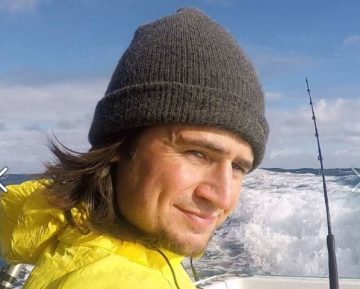 A crew member on the fishing vessel Odin was found dead Saturday morning. Wrangell Search and Rescue responded to the scene after the Coast Guard was notified around 5:47 am Saturday. Charles Richards of Seattle, who went by Rhett, was found unresponsive in his bunk by a crew member. He was 28 years old. Richards was taken to the Wrangell clinic where he was pronounced dead and was transferred to the state medical examiner’s office in Anchorage for autopsy. The cause of death is not known. Mark Severson of Petersburg is the owner of the Odin. He says Richards went to college with his son Cameron. “That’s how he came to get on the boat,” Severson said. “I needed a guy, and he filled in. He was a great hard worker and a happy go-lucky kid.” Severson says his son Cameron recently took over operating the boat. Read the rest here 18:52:
A crew member on the fishing vessel Odin was found dead Saturday morning. Wrangell Search and Rescue responded to the scene after the Coast Guard was notified around 5:47 am Saturday. Charles Richards of Seattle, who went by Rhett, was found unresponsive in his bunk by a crew member. He was 28 years old. Richards was taken to the Wrangell clinic where he was pronounced dead and was transferred to the state medical examiner’s office in Anchorage for autopsy. The cause of death is not known. Mark Severson of Petersburg is the owner of the Odin. He says Richards went to college with his son Cameron. “That’s how he came to get on the boat,” Severson said. “I needed a guy, and he filled in. He was a great hard worker and a happy go-lucky kid.” Severson says his son Cameron recently took over operating the boat. Read the rest here 18:52:
Rules tightened on shark fin removal at sea
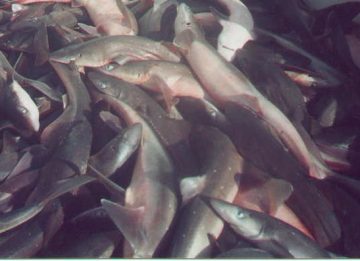 Interstate regulators are tightening the restrictions on the last species of shark that can have its fins removed at sea in the U.S. Smooth dogfish are the only sharks from which American fishermen can remove fins at sea. Many other sharks can be hunted, but fins can’t be removed until processing on land. The Atlantic States Marine Fisheries Commission voted Tuesday to approve a new rule that allows fishermen to bring smooth dogfish to land with fins removed, as long as their total retained catch is at least 25 percent smooth dogfish. Right now, they can bring ashore as many as they choose. The rule change would better incorporate the Shark Conservation Act of 2010 into management of the dogfish, staff with the fisheries commission said. The dogfish are harvested from Rhode Island to North Carolina, and are among the many shark species that fishermen bring to land in states from Maine to Texas. Sharks are also hunted for their meat, but their greatest value is in their fins, which are used to make shark fin soup. Read the rest here 17:33
Interstate regulators are tightening the restrictions on the last species of shark that can have its fins removed at sea in the U.S. Smooth dogfish are the only sharks from which American fishermen can remove fins at sea. Many other sharks can be hunted, but fins can’t be removed until processing on land. The Atlantic States Marine Fisheries Commission voted Tuesday to approve a new rule that allows fishermen to bring smooth dogfish to land with fins removed, as long as their total retained catch is at least 25 percent smooth dogfish. Right now, they can bring ashore as many as they choose. The rule change would better incorporate the Shark Conservation Act of 2010 into management of the dogfish, staff with the fisheries commission said. The dogfish are harvested from Rhode Island to North Carolina, and are among the many shark species that fishermen bring to land in states from Maine to Texas. Sharks are also hunted for their meat, but their greatest value is in their fins, which are used to make shark fin soup. Read the rest here 17:33
The Menemsha Fish House. What’s going on in there?!!
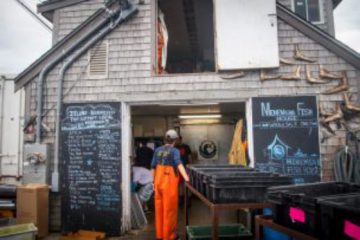 Alec Gale is well-known in the world of Martha’s Vineyard commercial fishing. The Island native started a business, the Menemsha Fish House, in 2006 with the goal of providing fresh fish to local buyers, with extra product being shipped to the mainland. A lot has happened along the way; you might say the fates have been kind. Also kind has been the town of Menemsha, which has supported his efforts in various ways. A decade of long hours and hard work paved the way. Where he once had a crew of four working just the summer months, Alec now has 12 people working year-round. He also has two very sharp guys named Mike who oversee the business end of things. Experience has brought insights and new ideas. Necessity has brought inventive — even funky — gadgetry with which to process thousands of pounds of fish every day. A generous spirit, considerable knowledge, and an unflinching sense of fairness and trust have brought 300 local fishermen as providers as well as countless loyal customers from Aquinnah to Edgartown. Read the story here 17:05
Alec Gale is well-known in the world of Martha’s Vineyard commercial fishing. The Island native started a business, the Menemsha Fish House, in 2006 with the goal of providing fresh fish to local buyers, with extra product being shipped to the mainland. A lot has happened along the way; you might say the fates have been kind. Also kind has been the town of Menemsha, which has supported his efforts in various ways. A decade of long hours and hard work paved the way. Where he once had a crew of four working just the summer months, Alec now has 12 people working year-round. He also has two very sharp guys named Mike who oversee the business end of things. Experience has brought insights and new ideas. Necessity has brought inventive — even funky — gadgetry with which to process thousands of pounds of fish every day. A generous spirit, considerable knowledge, and an unflinching sense of fairness and trust have brought 300 local fishermen as providers as well as countless loyal customers from Aquinnah to Edgartown. Read the story here 17:05
PETA protester sheds shell for cause!
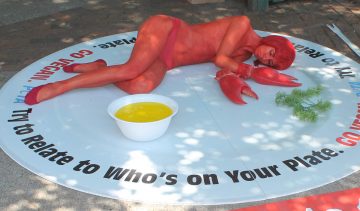 A crowd of curious spectators and journalists gathered at the corner of Park and Main Streets Aug. 3 to witness a supporter of PETA (People for the Ethical Treatment of Animals) shed most of her clothes and lie on plate like a lobster in protest of the annual Maine Lobster Festival. Mysti Lee (sounds exotic!)of Chicago, painted all in red and wearing lobster claws but little else, emulated Maine’s famous crustacean on a plate with to-scale cutlery, a garnish of cilantro and a side of butter across the street from the Maine Lobster Festival. Lobster Festival President Brian Plourde said Aug. 2 the festival has had protests from PETA in years past. “PETA has every right to protest,” he said. “…We’re here to support the fishing community.” Read the story here 16:28
A crowd of curious spectators and journalists gathered at the corner of Park and Main Streets Aug. 3 to witness a supporter of PETA (People for the Ethical Treatment of Animals) shed most of her clothes and lie on plate like a lobster in protest of the annual Maine Lobster Festival. Mysti Lee (sounds exotic!)of Chicago, painted all in red and wearing lobster claws but little else, emulated Maine’s famous crustacean on a plate with to-scale cutlery, a garnish of cilantro and a side of butter across the street from the Maine Lobster Festival. Lobster Festival President Brian Plourde said Aug. 2 the festival has had protests from PETA in years past. “PETA has every right to protest,” he said. “…We’re here to support the fishing community.” Read the story here 16:28
‘Sea change:’ NOAA to shift fish surveys to Commercial Fishing Vessels
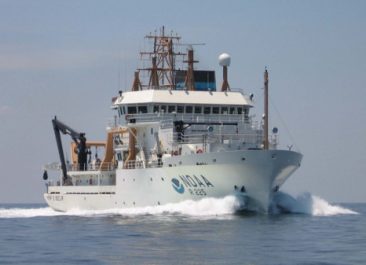 In what one advocate called “a potential sea change” for the commercial fishing industry, NOAA Fisheries announced intentions Tuesday to shift all or part of long-controversial stock surveys from its Bigelow research vessel to commercial boats, saying a transition over the next five years could bring “greater shared confidence” in survey results. “We have to learn to work better with the (commercial fishing) industry — we have to open up better lines of communication,” Dr. Bill Karp, director of NOAA’s Northeast Fisheries Science Center in Woods Hole, said of the transition. Don Cuddy, program director for the Center for Sustainable Fisheries in New Bedford, said fishermen also have felt the Bigelow is unable to accurately count “flatfish,” such as yellowtail flounder, because of the type of gear it tows. “This is going to affect everything across the board — the fishermen have been saying for years that the catch limits and stock assessments do not reflect what they’re seeing on the water,” said Cuddy, who used the “sea change” phrase. Read the story here 15:57
In what one advocate called “a potential sea change” for the commercial fishing industry, NOAA Fisheries announced intentions Tuesday to shift all or part of long-controversial stock surveys from its Bigelow research vessel to commercial boats, saying a transition over the next five years could bring “greater shared confidence” in survey results. “We have to learn to work better with the (commercial fishing) industry — we have to open up better lines of communication,” Dr. Bill Karp, director of NOAA’s Northeast Fisheries Science Center in Woods Hole, said of the transition. Don Cuddy, program director for the Center for Sustainable Fisheries in New Bedford, said fishermen also have felt the Bigelow is unable to accurately count “flatfish,” such as yellowtail flounder, because of the type of gear it tows. “This is going to affect everything across the board — the fishermen have been saying for years that the catch limits and stock assessments do not reflect what they’re seeing on the water,” said Cuddy, who used the “sea change” phrase. Read the story here 15:57
Transportation Safety Board: Culture shift needed to make Canadian fishing industry less deadly
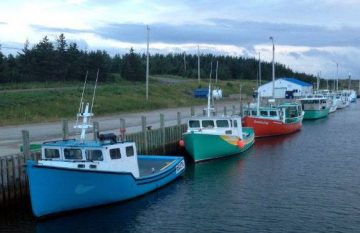 The fishing industry has cost more than 30 Canadian lives since 2000 and must improve its culture of safety, the Transportation Safety Board said as it released a report into a Newfoundland accident that left three people dead. The board said the tragedy near Placentia Bay last year demonstrates the need for increased regulations around fishing safety and a change of attitudes among fishermen. “The number of accidents involving loss of life on fishing vessels remains too high,” the report said, adding there were 31 deaths involving commercial fishing vessels between 2000 and 2015. “Concerted and co-ordinated action is required by federal and provincial authorities and by leaders in the fishing community to improve the safety culture in fishing operations.” Read the rest here 13:32
The fishing industry has cost more than 30 Canadian lives since 2000 and must improve its culture of safety, the Transportation Safety Board said as it released a report into a Newfoundland accident that left three people dead. The board said the tragedy near Placentia Bay last year demonstrates the need for increased regulations around fishing safety and a change of attitudes among fishermen. “The number of accidents involving loss of life on fishing vessels remains too high,” the report said, adding there were 31 deaths involving commercial fishing vessels between 2000 and 2015. “Concerted and co-ordinated action is required by federal and provincial authorities and by leaders in the fishing community to improve the safety culture in fishing operations.” Read the rest here 13:32
Athearn Marine Agency Boat of the Week: 42′ Duffy Lobster/Scalloper, 500HP, 6 Cylinder Lugger
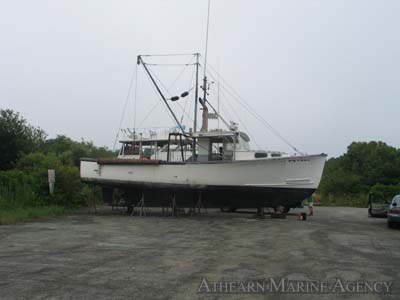 Specifications, information and 14 photo’s click here To see all the boats in this series, Click here 13:18
Specifications, information and 14 photo’s click here To see all the boats in this series, Click here 13:18
Southern New England Crustacean frustrations ahead of ASMFC Lobster Board meeting
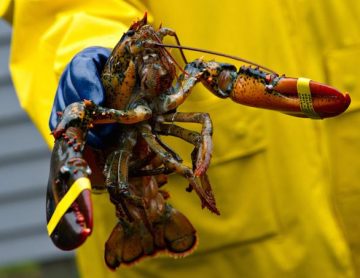 Fisheries regulators this week will weigh the need for new restrictions on lobster catches in the southern New England coastal area in the wake of steep drops in lobster populations that many scientists attribute to warming ocean waters. Some New England fishermen, however, dispute the assessment by the Atlantic State Marine Fisheries Commission, arguing that the situation is not as dire as the regulators fear. Greg Mataronas, president of the Rhode Island Lobstermen’s Association, told AMI Newswire that his members are nervous about what steps the commission will take. In the area where he fishes – the ocean waters between the Rhode Island-Connecticut border and Chatham, Mass. – lobster fishermen have already imposed trap restrictions on themselves, he said. Asked about the size of his lobster catches, Mataronas said: “It’s been better and better every year since 2012.” He also expressed some uncertainty about scientists’ view that warming waters were an overriding factor in the challenges facing the lobster population. Read the story here 11:47
Fisheries regulators this week will weigh the need for new restrictions on lobster catches in the southern New England coastal area in the wake of steep drops in lobster populations that many scientists attribute to warming ocean waters. Some New England fishermen, however, dispute the assessment by the Atlantic State Marine Fisheries Commission, arguing that the situation is not as dire as the regulators fear. Greg Mataronas, president of the Rhode Island Lobstermen’s Association, told AMI Newswire that his members are nervous about what steps the commission will take. In the area where he fishes – the ocean waters between the Rhode Island-Connecticut border and Chatham, Mass. – lobster fishermen have already imposed trap restrictions on themselves, he said. Asked about the size of his lobster catches, Mataronas said: “It’s been better and better every year since 2012.” He also expressed some uncertainty about scientists’ view that warming waters were an overriding factor in the challenges facing the lobster population. Read the story here 11:47
Grand Manan Fisherman’s Association welcomes $4.9 million to expand the Fundy Marine Service Centre
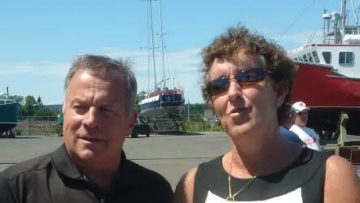 After about a decade of lobbying the New Brunswick government, fishermen in Grand Manan celebrated an investment announcement yesterday of $4.9 million to expand the Fundy Marine Service Centre. The centre, located at Ingalls Head, is owned by the province, but operated by the Grand Manan Fishermen’s Association. The money will be used for extensive site upgrades, which includes a new 200-tonne boat lift, better lighting, paving a portion of the outdoor lot, better access to electricity, and better water access for firefighting. “It’s a very busy place, and this time of year, given the weather that we’ve had, everybody wants to get their vessels in and do maintenance before we get into our winter fishery,” said Melanie Sonnenberg, the association’s project manager. Read the rest here 10:30
After about a decade of lobbying the New Brunswick government, fishermen in Grand Manan celebrated an investment announcement yesterday of $4.9 million to expand the Fundy Marine Service Centre. The centre, located at Ingalls Head, is owned by the province, but operated by the Grand Manan Fishermen’s Association. The money will be used for extensive site upgrades, which includes a new 200-tonne boat lift, better lighting, paving a portion of the outdoor lot, better access to electricity, and better water access for firefighting. “It’s a very busy place, and this time of year, given the weather that we’ve had, everybody wants to get their vessels in and do maintenance before we get into our winter fishery,” said Melanie Sonnenberg, the association’s project manager. Read the rest here 10:30


































